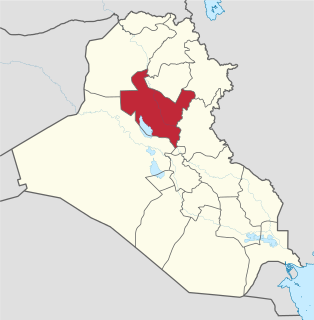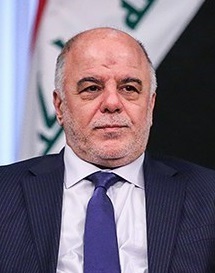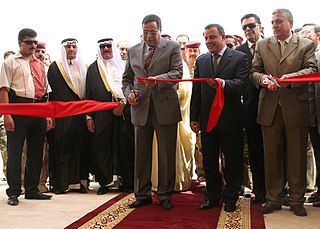| |||
All 29 seats for the Saladin Governorate council | |||
|---|---|---|---|
| |||
The Saladin Governorate election of 2013 was held on 20 April 2013 alongside elections for all other governorates outside Iraqi Kurdistan, Kirkuk, Anbar and Nineveh.
| |||
All 29 seats for the Saladin Governorate council | |||
|---|---|---|---|
| |||
The Saladin Governorate election of 2013 was held on 20 April 2013 alongside elections for all other governorates outside Iraqi Kurdistan, Kirkuk, Anbar and Nineveh.
| Party/Coalition | Allied national parties | Leader | Seats | Change | Votes | |
|---|---|---|---|---|---|---|
| Iraqi People's Coalition | Ahmed Abdullah al-Jubouri | 7 | 95,338 | |||
| Muttahidoon | al-Hadba Iraqi Islamic Party | Usama al-Nujayfi | 5 | 79,705 | ||
| Iraq's Authenticity Coalition | 5 | 66,549 | ||||
| Al Iraqia National and United Coalition | Ayad Allawi | 3 | 46,287 | |||
| Salahuddine National Alliance | 3 | 39,447 | ||||
| Equality Front | 27,654 | |||||
| Arabian Al Iraqia | 2 | 24,167 | ||||
| Salahuddine Unified Coalition | 2 | 23,497 | ||||
| Brotherhood and Coexistence Alliance List | KDP PUK | 1 | 21,373 | |||
| Salahuddine Turkmen's list | 1 | 18,395 | ||||
| Iraq's Benevolence and Generosity List | 6,099 | |||||
| Reformers Gathering | 6,041 | |||||
| Iraq for Everyone National Bloc | 4,243 | |||||
| Citizenship and Change Movement | 3,117 | |||||
| Iraq's Light Movement | 3,023 | |||||
| Iraqi Justice and Democracy Alliance | 774 | |||||
| Islamic Advocates' Party | 553 | |||||
| Law Advocate Knights' Bloc | 468 | |||||
| Revolution Forces' Alliance in Iraq | 461 | |||||
| Total | 29 | 467,191 | ||||
| Sources: al-Sumaria – Salahuddin Coalitions, ISW, IHEC | ||||||
Following the election Ahmed Abdullah al-Jubouri was re-elected as governor. In December 2013 Juburi was suspended by Prime Minister Nouri al-Maliki for at least two months while allegations of corruption were investigated. [1]
The politics of Iraq take place in a framework of a federal parliamentary representative democratic republic. It is a multi-party system whereby the executive power is exercised by the Prime Minister of the Council of Ministers as the head of government, as well as the President of Iraq, and legislative power is vested in the Council of Representatives and the Federation Council.

The Saladin or Salah ad Din Governorate is one of Iraq's 19 governorates, north of Baghdad. It has an area of 24,363 square kilometres (9,407 sq mi), with an estimated population of 1,042,200 people in 2003. It is made up of 8 districts, with the capital being Tikrit. Before 1976 the province was part of Baghdad Governorate.

Haider Jawad Kadhim al-Abadi is an Iraqi politician who was Prime Minister of Iraq from September 2014 until October 2018. Previously he served as Minister of Communication from 2003 to 2004, in the first government after Saddam Hussein was deposed.

The Iraqi Islamic Party is the largest Sunni Islamist political party in Iraq as well as the most prominent member of the Iraqi Accord Front political coalition. It was part of the government of Prime Minister Nouri al-Maliki and is part of the current government of Haider al-Abadi since 2014. Osama Tawfiq al-Tikriti succeeded Vice-President Tariq al-Hashimi as the party's secretary-general on 24 May 2009, who was succeeded in July 2011 by Ayad al-Samarrai.

Governorate council elections were held in Iraq on 30 January 2005, the same day as the elections for the transitional Iraqi National Assembly. Each province has a 41-member council, except for Baghdad, whose council has 51 members.
The first government of Iraq led by Nouri al-Maliki took office on May 20, 2006 following approval by the members of the Iraqi National Assembly. This followed the general election in December 2005. The government succeeded the Iraqi Transitional Government which had continued in office in a caretaker capacity until the new government was formed and confirmed.

Osama Abdul Aziz al-Nujaifi or Najifi is an Iraqi politician and served as one of the three Vice Presidents of the country, from 2016 to 2018. As the Speaker of the Council of Representatives, the informal leader of the moderate Sunni al-Hadba party was the highest ranking Sunni politician of Iraq.

Governorate or provincial elections were held in Iraq on 31 January 2009, to replace the local councils in fourteen of the eighteen governorates of Iraq that were elected in the 2005 Iraqi governorate elections. 14,431 candidates, including 3,912 women, contested 440 seats. The candidates came from over 400 parties, 75% of which were newly formed.

Parliamentary elections were held in Iraq on 7 March 2010. The elections decided the 325 members of the Council of Representatives who would elect the prime minister and president. The elections resulted in a partial victory for the Iraqi National Movement, led by former Interim Prime Minister Ayad Allawi, which won 91 seats, making it the largest alliance in the Council. The State of Law Coalition, led by incumbent Prime Minister Nouri Al-Maliki, was the second largest grouping with 89 seats.
The Basra governorate election of 2009 was held on 31 January 2009 alongside elections for all other governorates outside Iraqi Kurdistan and Kirkuk.
The Saladin governorate election of 2009, was held on 31 January 2009 alongside elections for all other governorates outside Iraqi Kurdistan and Kirkuk Governorate.

The State of Law Coalition also known as Rule of Law Coalition is an Iraqi political coalition formed for the 2009 Iraqi governorate elections by the Prime Minister of Iraq at the time, Nouri al-Maliki, of the Islamic Dawa Party.

Qasim Mohammad Abid Hammadi al-Fahadawi is an Iraqi politician and businessman who is the current Minister of Electricity in the Al Abadi Government, and who previously served as the Governor of Anbar from April 2009 to August 2013.

Governorate or provincial elections were held in Iraq on 20 April 2013, to replace the local councils in the governorates of Iraq that were elected in the Iraqi governorate elections of 2009. Elections took place in 12 of Iraq's 18 governorates. Elections didn't take place in the 3 governorates forming the Kurdistan Region or Kirkuk, Anbar, or Nineveh, meaning that a total of 378 provincial council seats were up for election.

The 2012–2013 Iraqi protests started on 21 December 2012 following a raid on the home of Sunni Finance Minister Rafi al-Issawi and the arrest of 10 of his bodyguards. Beginning in Fallujah, the protests afterwards spread throughout Sunni Arab parts of Iraq. The protests centered on the issue of the alleged sectarianism of Prime Minister Nouri al-Maliki. Pro-Maliki protests also took place throughout central and southern Iraq, where there is a Shia Arab majority. In April 2013, sectarian violence escalated after the 2013 Hawija clashes. The protests continued throughout 2013, and in December Maliki used security forces to forcefully close down the main protest camp in Ramadi, killing hundreds of civilian protesters in the process. Sunni groups, such as the Army of the Men of the Naqshbandi Order, took up arms in response, and joined forces with the General Military Council for Iraqi Revolutionaries (GMCIR), a militant group made up of former Ba'athists, to conduct a military campaign against the Iraqi government. The Islamic State of Iraq and the Levant (ISIL) would later grow out of this civil conflict, escalating into a full-scale war.
The Al Anbar governorate election of 2013 was held on 20 June 2013 alongside elections for Nineveh.
Ahmad Khalaf al-Dulaimi is an Iraqi politician and was the Governor of Al Anbar province from August 2013 to December 2014.

The Uniters for Reform Coalition is a Sunni political coalition in Iraq.

The Al-Ahrar Bloc is an Iraqi Shia Islamist political coalition formed for the 2014 Iraqi parliamentary election. It is headed by Dia Najem Abdallah al-Asadi.

Ahmed Abdullah Abid Khalaf al-Jubouri is an Iraqi politician from Salah ad-Din governorate, and a prominent figure in the Baiji area. He was the Minister of State for Provincial Affairs from 2014 to 2015 and the governor of Salah ad-Din governorate from 2013 to 2014.